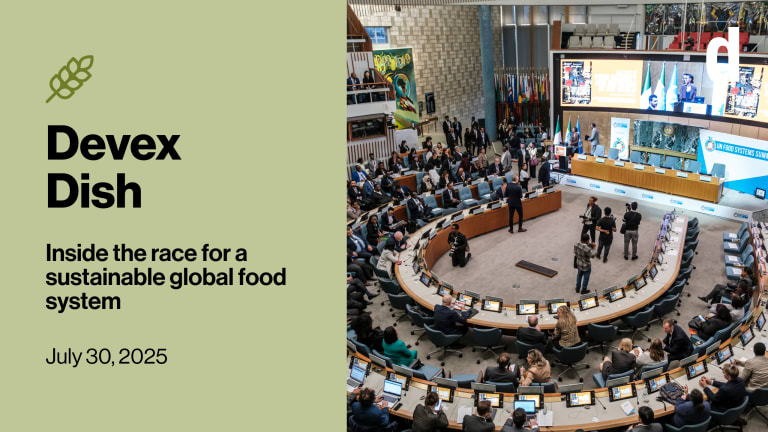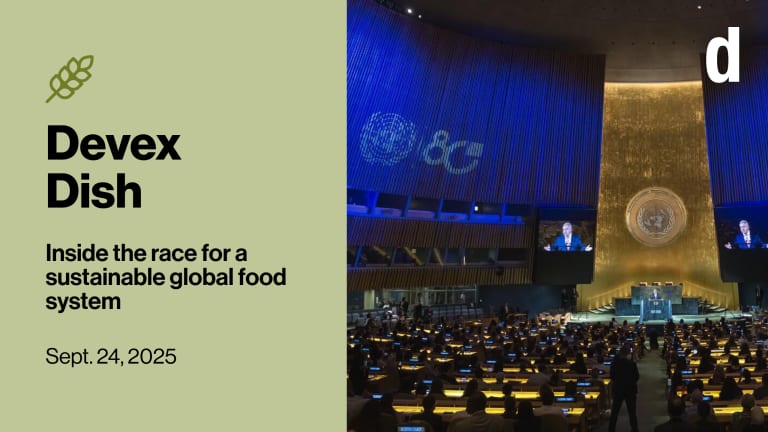
Optimism rose briefly on Friday that a long-sought deal to get grain out of Ukraine would help ease food price spikes around the world. But the day after the agreement, brokered by the U.N. and Turkey, was reached, Russia struck infrastructure at the port of Odesa. Wheat prices, which dropped Friday by 6% on announcement of the pact, were up again Monday by 4% to $7.86 a bushel.
This is a preview of Devex Dish
Sign up to this newsletter to get the inside track on how agriculture, nutrition, sustainability, and more are intersecting to remake the global food system in this weekly newsletter.
WFP Executive Director David Beasley initially lauded the deal as “GREAT NEWS” on Twitter but has yet to tweet about it since the port strike. WFP operational costs have been dramatically affected by food and oil price hikes: Already up 50% since 2019, expenses have increased by up to $71 million a month. This has forced the agency to cut back on rations in hunger hot spots such as Yemen and Ethiopia.
Around 5 million metric tons of grain are set to leave Ukraine each month under the agreement, and the first shipments could leave the country "within a few days," the U.N. said Monday.
Meanwhile, other humanitarians are warning that the deal is not a panacea.
“Unblocking Ukraine’s ports will not reverse the damage war has wreaked on crops, agricultural land and agricultural transit routes in the country,” says Mercy Corps CEO Tjada D'Oyen McKenna. “It will not significantly change the price or availability of fuel, fertilizer, and other staple goods that are now beyond the reach of many, particularly in lower-income countries; and it will certainly not help the majority of the 50 million people around the world inching closer to famine stave off starvation.”
I’ll be closely following the shaky implementation of the agreement and how it may affect affordable food access globally.
Read more: Beasley celebrates Ukraine grain deal; shipments to start within weeks
+ What do you think of the deal? Will it actually get exports out of Ukraine? Could it help reduce food prices where you live? Let me know your thoughts at dish@devex.com.
Step it up
Beasley was back on Capitol Hill last week for another round of what have become his regular yet dire warnings for the U.S. Congress that more must be done to avert the worst of famine around the world.
“Unfortunately, the rest of the world is not stepping up like it should,” he said, while praising financial contributions from the U.S. “China has only given us $3 million. The Gulf states, with unprecedented oil pricing, which is compounding the food crisis, should be stepping up in ways beyond anything we've seen before.”
U.S. Agency for International Development Administrator Samantha Power, who appeared beside Beasley in one hearing, criticized China for “not giving … at scale,” adding that the country has provided much more funding during past food crises than it has pledged for the current one.
Read: China, Gulf countries must step up to avoid food crisis, officials say
Missing the window
In a wide-ranging conversation with my colleague William Worley, former U.N. relief chief Mark Lowcock discussed what happens when malnutrition is not addressed early.
“You have to invest in very expensive … [interventions like the therapeutic food] Plumpy’Nut and all those things which cost a lot more to save a life than if you kept that child a bit healthier earlier on,” he said. “And so that money that could have been used for chronic undernutrition has been spent on expensively saving a life that could have been saved much more cheaply.”
Lowcock suggested that the problem has been worsened by the frequent separation of development and humanitarian teams, adding that improved coordination could be helpful.
Read more: Mark Lowcock on how extreme poverty fell off UK aid's radar (Pro)
ICYMI: Russia, China foiled UN meetings on Tigray famine, says Lowcock
+ A Devex Pro membership brings you essential analysis, data-driven funding insights, and access to the world’s largest global development job board. Get these perks and more by signing up to our 15-day free trial.
Gender gap
Without adequate intervention by international donors and governments in Africa, women and girls on the continent could be particularly harmed by the rise in food prices. A specific focus on this group may be a necessary part of an effective response to the crisis, write Funke Aderonmu and Phelisha Midy in an op-ed for Devex.
Opinion: Africa food security solutions must prioritize women and girls
Water you fighting about?
A lack of consensus between Kenyan farming communities and nonprofit groups is hindering plans for how to save water sources while also ensuring continued yields through established agriculture systems.
Between 80% and 90% of reservoirs and dams are drying up in parts of northern Kenya. As a result, pastoralists are losing their livestock, and lakeside communities are struggling to survive on fishing. Scarcer water sources are also increasing the price of water and food, leading to rising malnutrition.
While some blame farming communities for polluting waterways with fertilizer and draining them for irrigation, farmers insist that bigger issues are at play.
Read more: Clash over water sources puts Kenya’s food systems at risk
Bringing home the bacon: Your next job?
Director, Resilience and Food Systems
Counterpart International
United States
Chew on this
U.S. House members have introduced a bill to reauthorize the Global Food Security Act, including another five-year mandate for Feed the Future. [House Foreign Affairs Committee]
The Bill & Melinda Gates Foundation shouldn’t decide what type of agricultural development is best for Africa, write two representatives of the Alliance for Food Sovereignty in Africa. [Scientific American]
USAID is providing $476 million in humanitarian assistance, including food and nutrition support, for Somalia to tackle the unprecedented drought and looming famine in the country. [USAID]









